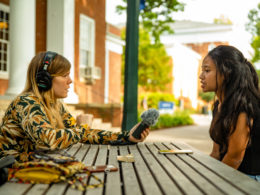Even reading What to Expect When You’re Expecting, or a host of parenting ‘how-to’ books, never fully prepares you to take your baby home for the first time and navigate what comes next.
The good news is that no-cost, voluntary home visiting programs connect families to a qualified family support professional who provides custom, family-centered coaching and guidance through pregnancy and the early stages of childhood (0-5).
Parenting can be tough, and economic pressures, isolation and barriers like transportation, housing and food costs are putting additional strains on modern families.
Home visitors build trust and support parents as they set goals, access needed resources and practice new skills as they grow in their parenting role. No matter what’s going on, home visiting brings back the focus to children’s needs and development.
![75% of parents engaged in home visiting said that they've been able to spend more time "playing with and enjoying [their] children."](https://thephilva.com/wp-content/uploads/2023/12/EIV-Social-Template-21-1024x1024.png)
“Babies are not born into isolation, they’re born into a family,” said Nanci Pedulla, director of Northern Virginia Family Service Healthy Families. “And everything that affects their growth and development revolves around the nurturing relationships that they have from the get-go, from day one.”
Early Impact Virginia (EIV) is the statewide, nonprofit alliance helping to ensure all pregnant and parenting families have access to high-quality, early childhood home visiting, how and when they choose. It supports more than 70 localized programs, which serve nearly 7,000 families each year.
We sat down with three of the nonprofits to discuss the impact home visiting has on families across the commonwealth.
- Healthy Families Central Virginia operates under HumanKind, a nonprofit human services organization serving Virginians since 1903. Healthy Families works with more than 120 families in and around the Lynchburg area per year. Ashley Graham, chief operating officer at HumanKind and former director of Healthy Families, supervises the program.
- Parents as Teachers (P.A.T.) of Greater Williamsburg is housed under Child Development Resources (CDR), a nonprofit agency serving prenatal and young families in the Williamsburg area. Amanda Wheeler, a licensed clinical social worker, and her team serve 60-70 families each year.
- Northern Virginia Family Service (NVFS) Healthy Families works to promote positive, nurturing, responsive parenting; improve child health and development; promote school readiness; and prevent child abuse and neglect across Northern Virginia. The program supports close to 700 families each year and is led by Nanci Pedulla.
“Parents deserve to parent in community.”
Home visitors are someone to lean on during times of excitement, but also in times of stress, confusion and adversity.
“At some point in our history, our society decided that parents should be able to do it alone, and that’s absolutely not true,” Graham said. “What’s incredible about home visiting is that all it takes is one stable and consistent person, in relationship with parents, to create that community.”
One expectant mother in Northern Virginia received the likely diagnosis that her child may have Down syndrome. While she initially refused to accept the news, the home visitor immediately got to work educating and nurturing the bond between mother and child. She was connected with a parent support group and became a vocal advocate for children with special needs, all before the child turned one.
Families often are able to figure things out for themselves on their own timeline, but with a little help and nudge in the right direction, goals become more attainable quicker – allowing other goals to manifest.
EIV recently surveyed parents who engage in home visiting and found that their biggest worries revolved around mental health and their children “being happy.” With home visiting, their lives have improved in core areas of transportation, affordable housing and healthy food, and nearly 75% of parents report they’ve been able to spend more time “playing with and enjoying [their] children.”

“In my experience, families have the resilience and skills necessary to effectively navigate their own barriers and challenges,” Wheeler said. “Home visitors, however, are uniquely positioned to walk with families on their journey providing reassurance, support, guidance and resource connections.”
The relationship is also reminiscent of a knowledgeable friend who you’d call up for advice.
During the pandemic, one Bedford mom was trying to find budget-friendly, healthy meals for her family. Her home visitor, Lindsey, set out to buy a nutritious meal under $10 for herself and the family and dropped off the bag of groceries on her doorstep. They later hopped on a video call to cook together and talk.
“Home visiting is complex, but the heart of it – connection and community, which is where the impact comes from – is so simple,” Graham said.
Stay tuned for part two, where we’ll break down some of the key challenges programs are facing. Learn more about home visiting and EIV, here.
At the date of publication, Early Impact Virginia is a client of The Hodges Partnership.










